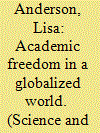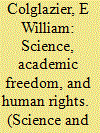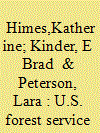| Srl | Item |
| 1 |
ID:
148195


|
|
|
|
|
| Summary/Abstract |
At the 153rd annual meeting of the National Academies of Sciences, Engineering, and Medicine in early May 2016, the Academies’ Committee on Human Rights invited Lisa Anderson, recent past president of the American University in Cairo, dean emerita of Columbia University’s School of International and Public Affairs, and former member of the board of Human Rights Watch, to reflect on current issues surrounding academic freedom. This article is adapted from her remarks.
|
|
|
|
|
|
|
|
|
|
|
|
|
|
|
|
| 2 |
ID:
148200


|
|
|
|
|
| Summary/Abstract |
“If you want to walk fast, walk alone. If you want to walk far, walk together.” That was one of the booming echoes that touched both my head and my heart during the AAAS-TWAS (American Association for the Advancement of Science, publisher of Science & Diplomacy, and The World Academy of Sciences) Course on Science Diplomacy 2016.
|
|
|
|
|
|
|
|
|
|
|
|
|
|
|
|
| 3 |
ID:
148199


|
|
|
|
|
| Summary/Abstract |
Science has long connected researchers across boundaries—geographic and otherwise—through a shared search for answers. From the appointment of a foreign secretary of the Royal Society of London in 1723, to the U.S.-Japan Committee on Scientific Cooperation set up by President John F. Kennedy and Prime Minister Hayato Ikeda in 1961, to the continued collaborations that support the International Space Station, science has often been deployed for diplomacy.
|
|
|
|
|
|
|
|
|
|
|
|
|
|
|
|
| 4 |
ID:
148197


|
|
|
|
|
| Summary/Abstract |
As a country with a direct connection to the Arctic by sea, there has been growing recognition within Japan that environmental change at the top of the world is an issue that could impact the whole earth, including this maritime nation. At the same time, however, Japan recognizes its link to and role in the environmental changes occurring in the Arctic.
|
|
|
|
|
|
|
|
|
|
|
|
|
|
|
|
| 5 |
ID:
148196


|
|
|
|
|
| Summary/Abstract |
Science can be a useful tool for improving international relations within regions, including Latin America. There have been some experiments aimed at testing whether education of Latin American scientists under a new paradigm can contribute toward strengthening regional and global integration in the region. Specifically, it is worth delving into two initiatives—the International Institutes for Interdisciplinary Innovation (I4) and the Latin American Center for Interdisciplinary Formation (CELFI)—aimed at creating environments in which young Latin American scientists can establish personal bonds that can lead to future scientific cooperation at a regional level. At the same time, these initiatives should promote the sense of social responsibility that is not usually emphasized in the scientific centers of excellence in developed countries.
|
|
|
|
|
|
|
|
|
|
|
|
|
|
|
|
| 6 |
ID:
148194


|
|
|
|
|
| Summary/Abstract |
“Academic Freedom in a Globalized World,” in the September issue of Science & Diplomacy is a powerful reminder of the critical importance of academic freedom to the pursuit and advance of science in a world with complexities and dangers. It also emphasizes the importance of the world’s science community in providing support and assistance to colleagues at risk and the challenging questions that are faced in doing so responsibly and effectively.
|
|
|
|
|
|
|
|
|
|
|
|
|
|
|
|
| 7 |
ID:
148198


|
|
|
|
|
| Summary/Abstract |
Amid the rolling green-forested hills, a meandering trout stream, and tall grasslands of the Carson National Forest in northern New Mexico, the delegation of Central Asian conservation leaders listened intently as United States Forest Service (USFS) rangers and a coalition of public-private partners explained innovative conservation and restoration practices.
|
|
|
|
|
|
|
|
|
|
|
|
|
|
|
|